|
Citroen C4 Picasso
Debut: 2006
Maker: Citroen
Predecessor: no |
|
Grand
Picasso*
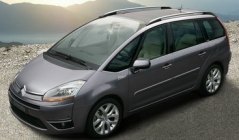 The new
C4 Picasso is not a
replacement to Xsara Picasso, because it has gone big and gone
upmarket. C-segment-based Multi-Activity Vehicle (MAV) should be
relatively compact and affordable, but C4 Picasso challenges the
definition of MAV by stretching the Citroen C4 / Peugeot 307 platform
to 1830mm in width and 4590mm in length. That's only 24mm narrower and
136mm shorter than C8, Citroen's full-size MPV. That's why Citroen will
continue to sell the old Xsara Picasso as a budget model, much in the
same way as Peugeot sells 206 alongside 207. The new
C4 Picasso is not a
replacement to Xsara Picasso, because it has gone big and gone
upmarket. C-segment-based Multi-Activity Vehicle (MAV) should be
relatively compact and affordable, but C4 Picasso challenges the
definition of MAV by stretching the Citroen C4 / Peugeot 307 platform
to 1830mm in width and 4590mm in length. That's only 24mm narrower and
136mm shorter than C8, Citroen's full-size MPV. That's why Citroen will
continue to sell the old Xsara Picasso as a budget model, much in the
same way as Peugeot sells 206 alongside 207.
From the pictures I would say the C4 Picasso is very promising. It has
a sophisticated and tasteful design, more stylish than Ford S-Max /
Galaxy and the current class leader Renault Grand Scenic as well as
Opel Zafira. If you look at its mechanical aspect, it is rather modest
– engines include only a 125hp 1.8 petrol, 143hp 2.0 petrol and 110hp /
138hp 2.0 HDI turbo diesels. Gearbox is a 6-speed automated manual. It
will be slow, but most customers in this segment ask for good packaging
and comfort rather than performance, which is where the C4 Picasso will
shine.
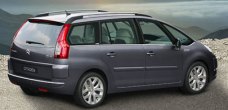 The car offers a class-leading window area
of 6.4m2 (including panoramic glass roof), most notably is the
windscreen which expand deep into the roof. Moreover, the A-pillars are
made narrow, followed by a pair of large quarter windows to eliminate
blindspot – a thing most modern MPVs did so badly. This airiness is
matched by a clean, modern and expensive feeling interior design. It
has fashionable centrally-mounted digital speedometer that simplifies
the whole dashboard design. It employs two-tone color and
aluminum-effect plastic vents to enhance ambience. High-quality
rubberized plastics are top notch. A 4-zone climate control allows
individual adjustment for the front and second row. The car offers a class-leading window area
of 6.4m2 (including panoramic glass roof), most notably is the
windscreen which expand deep into the roof. Moreover, the A-pillars are
made narrow, followed by a pair of large quarter windows to eliminate
blindspot – a thing most modern MPVs did so badly. This airiness is
matched by a clean, modern and expensive feeling interior design. It
has fashionable centrally-mounted digital speedometer that simplifies
the whole dashboard design. It employs two-tone color and
aluminum-effect plastic vents to enhance ambience. High-quality
rubberized plastics are top notch. A 4-zone climate control allows
individual adjustment for the front and second row.
However, what truly distinctive are the steering wheel and interior
lighting. Like C4, the steering wheel has a fixed hub around which the
wheel rim turns. This feature not only looks spaceship-like but it
enhances ergonomics, because all controls of the car are placed on the
fixed hub and easily reach by the driver without distracting attention
from the road. C4 Picasso also pays special attention to cabin
atmosphere at night. Employing LED and optic fiber technology previewed
by the C-Airlounge concept car, it has light guides under the front
fascia, in the door panels and in the headlining that diffuse soft
light. Citroen's designers know how to make their cars more attractive
than others.
Space is another strength of the car. Like
Zafira and Grand Scenic, it offers 7 seats in 3 rows, but the Citroen's
cabin is more spacious, partly thanks to its extra width, partly
because its gearbox is paddle-shift thus has no transmission tunnel
between the front seats. This allow occupants to walk through from the
front row to the second row. The second row consists of 3 identical
independent seats which can fold flat easily by one action. The third
row can also fold flat onto the floor. There are four large storage
compartments in the dashboard, including a refrigerated cubby for cold
drinks. Luggage volume is 1951 litres when all seats are folded, or 576
litres in 5-seat configuration and the second row pushed to the
rearmost position. Both matches a full-size MPV.
On the road, the C4 Picasso is slow and unexciting to drive, but it is
surprisingly refined. The rear suspension has self-leveling pneumatic
springs to offset different load while providing a smooth and relaxed
ride. Thanks to laminated windows and the attention to sound deadening,
the cabin is quiet on the run. The range-topping 2.0 HDi engine is
smooth and refined, as is the 6-speed automatic. C4 Picasso has an
upmarket feel eclipsing even Renault Scenic.
* Remark on 11 Feb
2007:
following the launch of the 5-seat version, the 7-seat Picasso has been
renamed to "Grand C4 Picasso" to distinguish the two.
|
| The
above report was last updated on 20 Sep
2006. All Rights Reserved. |
Picasso
|
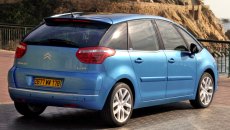 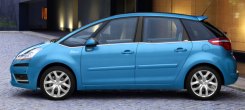
With the launch of the
5-seat
version C4 Picasso, the 7-seat version has been renamed to Grand C4
Picasso to distinguish the two. We always love the 7-seat version for
its great look, high-quality packaging and comfort. Nevertheless, if
you don't need to carry more than 5 people, the 5-seat Picasso betters
the grand version in every way.
First of all, its exterior design is sleeker and more stylish, thanks
to the sloping tailgate, glass-covered D-pillars and the characteristic
steps over the waistline. Secondly, the rear overhang is shortened by
12cm while the wheelbase remains unchanged. This means it offers a huge
room for 5 people and luggage (as much as 500 liters with all seats in
place), while the shorter body improves cornering agility and the 40 kg
of weight reduction raises performance slightly.
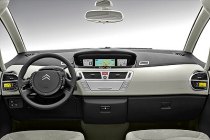 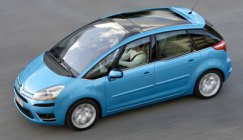
Mechanical-wise, the
5-seater is the
unchanged from the 7-seater. Again, the best combination is the 2.0HDi
diesel engine, 6-speed automatic gearbox and pneumatic rear suspension,
thanks to its relaxed manner. No C4 Picasso can challenge Ford C-Max or
S-Max for driver appeal, but in return no one else can rival it for
comfort, style, visibility, quality and overall desirability.
This is an extremely well finished product and deserves great success.
An excellent car is made even better by the 5-seat version.
|
| The
above report was last updated on 11 Feb
2007. All Rights Reserved. |
|
|